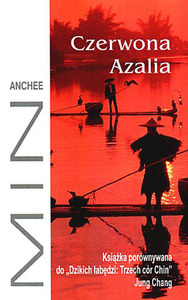Take a photo of a barcode or cover
adventurous
challenging
dark
emotional
tense
fast-paced
challenging
emotional
reflective
sad
slow-paced
I think I found this a bit of a struggle because of my lack of knowledge of the Chinese cultural Revolution, but it was very emotional and interesting in parts.
This is Anchee Min’s memoir of growing up in the last years of Mao’s ruling in China. Mao used children to carry out the ‘Cultural Revolution’ from 1966 to 1967 and pass on his ideologies. During his time, many people were killed or get sent off to labour farms for not following his ideologies. Families lived in terror, not knowing when council members will show up and search their homes. This was the same for Anchee.
Anchee grew up in a family who fully conforms to the ideals of the Communism. Her youth is filled with absorbing and obsessing over the ideals of the Communist Party. The older she grew, the more conflicted she becomes about the life that she is meant to live in order to survive and not let her parents and the Party down. As a bright young woman, she is sent off to work at red Fire Farm where thousands of young people from other cities were sent to grow and harvest crops for the Communist Party. Her life on the farm became more bearable when she forms a strong friendship with Yan. Later on, an opportunity arises for Anchee to become an actress in a play called the Red Azalea. She thought she had finally found her way out but everything is not as easy as it seems.
This was quite an eye opening read for me. I learned that during Mao’s ruling, all Chinese citizens are to liberate themselves off any individualism and personal dreams. Everything you do, you need to have the Party’s best interest in mind. Everything had to be sacrificed to the greater scheme of making China great. You have no voice and no freedom. It is quite a heavy read but well worth for those who wants to learn a little more about Chinese history.
Anchee grew up in a family who fully conforms to the ideals of the Communism. Her youth is filled with absorbing and obsessing over the ideals of the Communist Party. The older she grew, the more conflicted she becomes about the life that she is meant to live in order to survive and not let her parents and the Party down. As a bright young woman, she is sent off to work at red Fire Farm where thousands of young people from other cities were sent to grow and harvest crops for the Communist Party. Her life on the farm became more bearable when she forms a strong friendship with Yan. Later on, an opportunity arises for Anchee to become an actress in a play called the Red Azalea. She thought she had finally found her way out but everything is not as easy as it seems.
This was quite an eye opening read for me. I learned that during Mao’s ruling, all Chinese citizens are to liberate themselves off any individualism and personal dreams. Everything you do, you need to have the Party’s best interest in mind. Everything had to be sacrificed to the greater scheme of making China great. You have no voice and no freedom. It is quite a heavy read but well worth for those who wants to learn a little more about Chinese history.
Anchee Min is a favorite interviewee for MPR/NPR. Aside from that, her novels have intruiging covers and are largely historical re-enactments of China's famous women. Just my style.
At least a year ago, I saw Min's newest novel, Empress Orchid, on the bookshelf. I decided not to spend the $30. I made this decision multiple times. Shortly thereafter, I heard Min being interviewed on NPR. A year passes. Just this last Sunday, MPR had another interview with Min. The next day, at my favorite coffee shop, there happened to be a copy of Min's autobiography, Red Azalea, which I dutifully picked up and read.
Min's story is that of a youth enamored of the Communists in Mao China, who volunteers to take on the hard job of a peasant on one of China's workfarms. These places worked their charges to the bone, and still they did not produce enough food to even provide for their own workers. Her story is one of hardship, but willingly endured hardship-- indeed, she notes that she was "looking forward to hardship" in the beginning of the book.
It is a unique story in that it's not the prototypical "Communism is a horrible thing and Mao ruined it for everyone in China". Min performed her role as an avid Communist with vigour and did not shirk from the ideas Westerners would find repulsive. Min suffered as her family was moved to progressively scantier lodgings, as she denounced her favorite teacher in front of the entire school, as she lost her best friend/lover. But she survived. And tells her story.
2005-09-30
At least a year ago, I saw Min's newest novel, Empress Orchid, on the bookshelf. I decided not to spend the $30. I made this decision multiple times. Shortly thereafter, I heard Min being interviewed on NPR. A year passes. Just this last Sunday, MPR had another interview with Min. The next day, at my favorite coffee shop, there happened to be a copy of Min's autobiography, Red Azalea, which I dutifully picked up and read.
Min's story is that of a youth enamored of the Communists in Mao China, who volunteers to take on the hard job of a peasant on one of China's workfarms. These places worked their charges to the bone, and still they did not produce enough food to even provide for their own workers. Her story is one of hardship, but willingly endured hardship-- indeed, she notes that she was "looking forward to hardship" in the beginning of the book.
It is a unique story in that it's not the prototypical "Communism is a horrible thing and Mao ruined it for everyone in China". Min performed her role as an avid Communist with vigour and did not shirk from the ideas Westerners would find repulsive. Min suffered as her family was moved to progressively scantier lodgings, as she denounced her favorite teacher in front of the entire school, as she lost her best friend/lover. But she survived. And tells her story.
2005-09-30
I actually really loved this memoir. Anchee Min's writing made me feel as if I was reading her personal diary or watching her memories unfold in her mind. Loved it!
A book you should read before you die. Some moments of exceptional literary genius. Frank writing with an almost poetic feel. The simplicity of it only adds to it's impact.
This taught me so much about China's history that I had never learned. This book was most spectacular, for me, because it really allowed me to step into the shoes of a person and a life and a culture that is so unlike my own. Really worth the read.
adventurous
dark
emotional
inspiring
reflective
sad
tense
medium-paced
Am crescut cu învăţăturile lui Mao şi operele doamnei Mao, tovarăşa Jiang Ching. Am devenit un lider al Micilor Gărzi Roşii la şcoala primară. Asta se întâmpla pe vremea Marii Revoluţii Culturale Proletare, când roşul era culoarea mea preferată. Părinţii mei trăiau, aşa cum îi descriau vecinii, precum o pereche de beţişoare pentru mâncat, mereu în armonie. Tata era profesor de desen tehnic industrial la Institutul de Cercetare pentru Textile din Shanghai, deşi adevărata sa dragoste era astronomia. Mama era profesoară la o şcoală generală din Shanghai. Preda orice îi cerea Partidul, un semestru în chineză şi următorul în rusă. Ambii mei părinţi credeau în Mao şi în Partidul Comunist, la fel ca toată lumea din cartier. Au avut patru copii, la diferenţă de un an. Eu m-am născut în 1957. Locuiam în oraş, pe Şoseaua Luxuriantă din Sud, într-o căsuţă cu etaj, ocupată de două familii. Casa ne-a fost lăsată prin testament de bunicul, care a murit de tuberculoză chiar înainte de naşterea mea.
Am fost adult de la vârsta de cinci ani. Asta nu era deloc ceva ieşit din comun. Toţi copiii cu care mă jucam îşi purtau în spate frăţiorii, legaţi cu o bucată de pânză. Cei mici se jucau cu propriii muci, în timp ce noi ne jucam de-a v-aţi ascunselea. Mi s-a dat în grijă familia deoarece părinţii noştri erau la muncă toată ziua, la fel ca părinţii tuturor celorlalţi copii.
Îi numeam pe surorile şi pe fratele meu copiii mei, pentru că eu trebuia să-i iau pe fiecare de la grădiniţă şi de la creşă, pe vremea când şi eu eram doar un copil de grădiniţă. Aveam şase ani când sora mea, Înflorita, avea cinci ani, cealaltă soră, Coral, avea patru ani, iar fratele meu, Cuceritorul Spaţiului, avea trei ani. Părinţii ne-au ales numele cu mare grijă. Au fost consideraţi excentrici, căci vecinii le puneau copiilor nume ca Garda Roşie, Marele Salt, Marşul cel Lung, Steaua Roşie, Revoluţia, China Nouă, Calea Rusiei, Împotriveşte-te Statelor Unite, Vestitorul Patriotic, Inegalabilul Soldat Roşu etc. Părinţii mei au avut propriile lor idei. La început, mie mi-au pus numele de Lin-Shuan, Soarele care Răsare la Munte. Au renunţat la el deoarece Mao era considerat singurul soare. După ce s-au gândit mai bine, mi-au pus numele de Anchee, Jadul Păcii, care semăna şi cu traducerea chineză a cuvântului englezesc angel (înger). M-au trecut în acte cu acest nume. Înflorita şi Coral au fost botezate după sunetul Chee (jad). Au existat două motive pentru care părinţii noştri i-au dat fratelui meu numele de Cuceritorul Spaţiului: unul a fost acela că tata iubea astronomia; al doilea a fost apelul făcut de Mao naţiunii de a se mobiliza pentru ca ţara noastră să lanseze în curând propria navă spaţială.
Am fost adult de la vârsta de cinci ani. Asta nu era deloc ceva ieşit din comun. Toţi copiii cu care mă jucam îşi purtau în spate frăţiorii, legaţi cu o bucată de pânză. Cei mici se jucau cu propriii muci, în timp ce noi ne jucam de-a v-aţi ascunselea. Mi s-a dat în grijă familia deoarece părinţii noştri erau la muncă toată ziua, la fel ca părinţii tuturor celorlalţi copii.
Îi numeam pe surorile şi pe fratele meu copiii mei, pentru că eu trebuia să-i iau pe fiecare de la grădiniţă şi de la creşă, pe vremea când şi eu eram doar un copil de grădiniţă. Aveam şase ani când sora mea, Înflorita, avea cinci ani, cealaltă soră, Coral, avea patru ani, iar fratele meu, Cuceritorul Spaţiului, avea trei ani. Părinţii ne-au ales numele cu mare grijă. Au fost consideraţi excentrici, căci vecinii le puneau copiilor nume ca Garda Roşie, Marele Salt, Marşul cel Lung, Steaua Roşie, Revoluţia, China Nouă, Calea Rusiei, Împotriveşte-te Statelor Unite, Vestitorul Patriotic, Inegalabilul Soldat Roşu etc. Părinţii mei au avut propriile lor idei. La început, mie mi-au pus numele de Lin-Shuan, Soarele care Răsare la Munte. Au renunţat la el deoarece Mao era considerat singurul soare. După ce s-au gândit mai bine, mi-au pus numele de Anchee, Jadul Păcii, care semăna şi cu traducerea chineză a cuvântului englezesc angel (înger). M-au trecut în acte cu acest nume. Înflorita şi Coral au fost botezate după sunetul Chee (jad). Au existat două motive pentru care părinţii noştri i-au dat fratelui meu numele de Cuceritorul Spaţiului: unul a fost acela că tata iubea astronomia; al doilea a fost apelul făcut de Mao naţiunii de a se mobiliza pentru ca ţara noastră să lanseze în curând propria navă spaţială.








